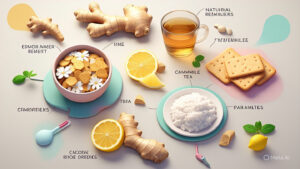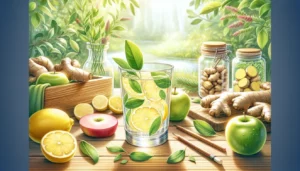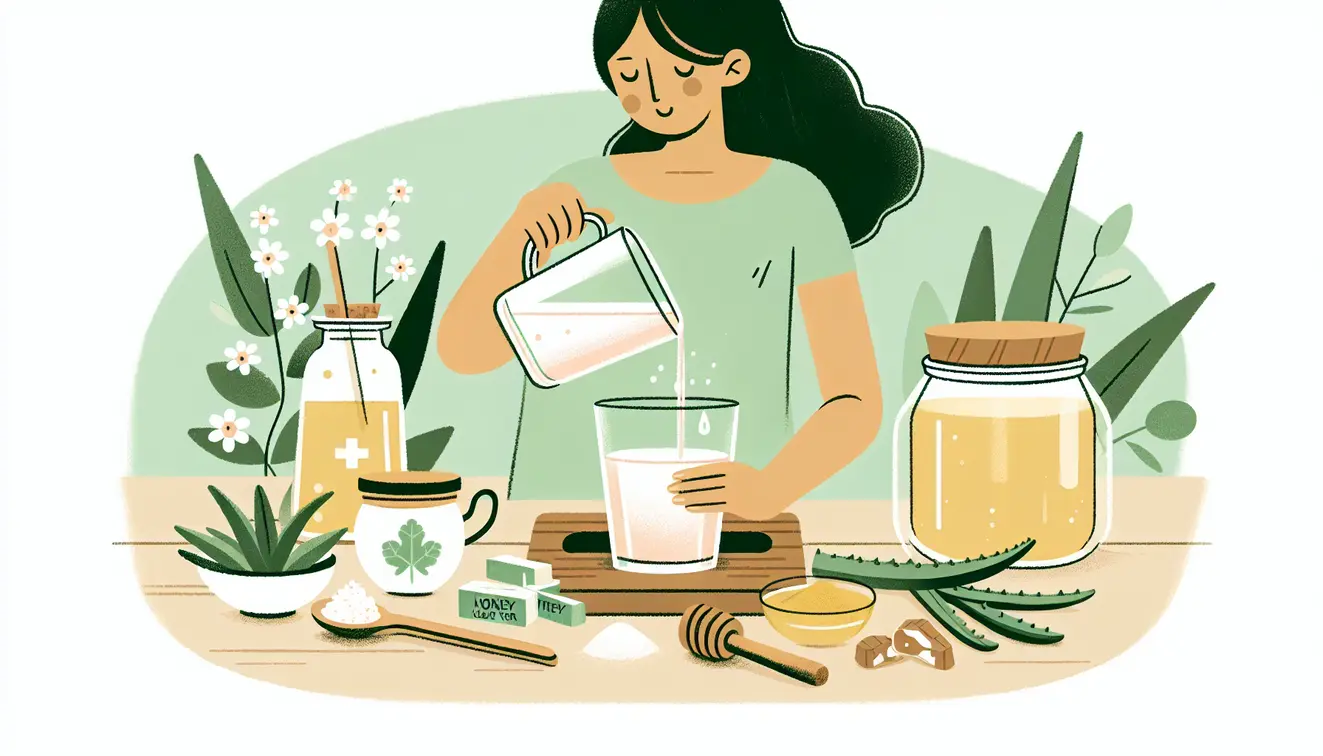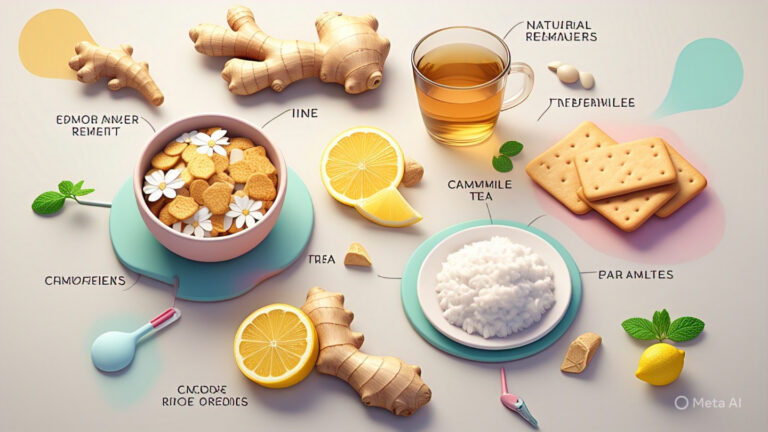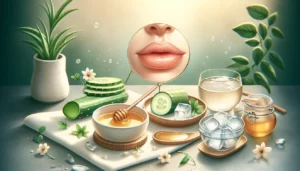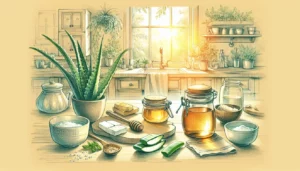Home Remedies for Mouth Sores and Ulcers: Soothe Pain Naturally Now
Estimated reading time: 8 minutes
Key Takeaways
- Natural Solutions: Simple home remedies like salt water rinses and honey can ease mouth sore pain effectively.
- Know the Cause: Stress, diet, and injuries often trigger sores—identifying these helps in prevention.
- Safety First: Seek medical help for sores lasting over 2-3 weeks or with severe symptoms.
- Prevention Tips: Gentle oral care and stress management can reduce future flare-ups.
Table of Contents
- 1. Introduction to Mouth Sores and Ulcers
- 2. What Are Mouth Sores and Ulcers? Causes and Triggers
- 3. When to Seek Medical Attention
- 4. Top 15 Home Remedies for Mouth Sores and Ulcers
- 5. How These Remedies Work: Science and Tradition
- 6. Prevention Tips for Mouth Sores and Ulcers
- 7. Common Myths and Mistakes to Avoid
- 8. Frequently Asked Questions (FAQs)
1. Introduction to Mouth Sores and Ulcers
If you’ve ever felt the sharp sting of a mouth sore or ulcer, you know how much it can disrupt your day. These tiny, painful spots can make eating, speaking, or even smiling a challenge. At WikiHomeRemedies, we understand this frustration and are here to guide you toward relief with safe, natural solutions rooted in science and tradition.
Mouth sores and ulcers, whether they’re canker sores, cold sores, or traumatic injuries, affect many of us at some point. Studies from the National Institutes of Health (NIH) suggest that up to 25% of people deal with these irritations in their lifetime. Our goal in this article is to share home remedies that can ease your discomfort and help you heal faster.
We’re committed to providing trustworthy information, drawing from reputable sources like WHO, NIH, and WebMD. While these natural approaches work for mild cases, remember to consult a healthcare provider if your condition worsens. Let’s explore how to soothe that pain and get back to feeling like yourself.
2. What Are Mouth Sores and Ulcers? Causes and Triggers
Mouth sores and ulcers are small, often painful lesions that form inside the mouth or on the lips. They come in different forms, each with unique traits and triggers. Knowing what causes them is the first step to finding relief and preventing them from coming back.
Many factors can lead to these irritations, from daily habits to health conditions. Stress, for instance, plays a big role, as confirmed by research from the Mayo Clinic. Diet also matters—spicy or acidic foods can spark discomfort in sensitive mouths. Physical injuries, like biting your cheek, or even hormonal shifts during certain life stages, can set the stage for sores to appear.
Infections, especially the herpes simplex virus behind cold sores, are another culprit. Underlying issues, such as deficiencies in vitamins like B12 or iron, or autoimmune conditions, can make you more prone to ulcers. The NIH notes that 1 in 5 people experience recurring canker sores annually, showing how common this struggle is. Understanding these triggers helps you choose the right remedy and take steps to avoid future flare-ups.
2.1 Types of Mouth Sores and Ulcers
- Canker Sores: Small, round, white or yellow spots with a red border, often inside the mouth. They’re not contagious but can hurt a lot. Learn more
- Cold Sores: Fluid-filled blisters usually near the lips, caused by the herpes virus. Unlike canker sores, these can spread through contact. Learn more
- Traumatic Ulcers: Result from physical injuries, like harsh brushing or accidental bites. They form wherever the tissue gets damaged.
2.2 Common Causes and Triggers
- Stress: Emotional tension can weaken your immune response, making sores more likely.
- Injury: Biting your tongue or using a rough toothbrush can break the skin.
- Dietary Choices: Spicy, acidic foods like citrus or hot peppers often irritate the mouth.
- Hormonal Changes: Shifts during puberty or menstrual cycles can trigger outbreaks.
- Infections: Viruses like herpes simplex lead to recurring cold sores. Learn more
- Health Conditions: Low levels of certain nutrients or autoimmune issues increase risk.
3. When to Seek Medical Attention
While many mouth sores heal on their own with simple care, some situations call for a doctor’s insight. At WikiHomeRemedies, we believe in empowering you with natural solutions for mild issues, but safety always comes first. Knowing when to step beyond home remedies is vital for your well-being.
Certain warning signs mean it’s time to seek help. The Mayo Clinic and WHO advise reaching out if your sores persist beyond 2 to 3 weeks, as this could point to a deeper concern. Severe pain that stops you from eating or drinking, or sores paired with fever, also demand attention. Sores that spread rapidly, or unusually large ones, might signal infections or even rare conditions like oral cancer.
Home remedies can be a wonderful first step for minor discomfort. Yet, don’t hesitate to consult a professional if something feels off. Below are key red flags to watch for:
- Sores lasting over 2-3 weeks without improvement.
- Intense pain that disrupts daily life.
- Accompanying fever or swollen glands.
- Sores that multiply or grow in size.
- Difficulty swallowing or speaking due to the sores.
4. Top 15 Home Remedies for Mouth Sores and Ulcers
Dealing with mouth sores doesn’t have to mean enduring pain without options. We’ve gathered 15 natural remedies that can bring relief, each chosen for its effectiveness and ease of use. Backed by science and time-tested traditions, these solutions target pain, swelling, and healing. Let’s walk through how to apply them safely at home.
- Salt Water Rinse
– Mix half a teaspoon of salt in a glass of warm water. Swish it around your mouth for 30 seconds, then spit.
– This reduces swelling and cleans the area. Use 2-3 times daily. Be gentle—don’t overdo it, as it might dry out tissues. - Honey Application
– Dab raw honey directly on the sore with a clean finger or cotton swab. Leave it for a few minutes before rinsing.
– Honey’s antibacterial power, noted by NIH studies, helps healing. Repeat 3-4 times a day, avoiding swallowing large amounts. - Aloe Vera Gel
– Extract fresh gel from an aloe leaf or use pure store-bought gel. Apply it to the sore and let it sit.
– It calms irritation with its cooling effect. Use twice daily, ensuring no allergies exist before starting. - Baking Soda Paste
– Mix a teaspoon of baking soda with a few drops of water into a paste. Apply to the sore for a minute, then rinse.
– This balances acidity in the mouth. Limit to once daily to prevent irritation. - Coconut Oil
– Apply a small amount of virgin coconut oil to the sore using a clean swab. Reapply every few hours.
– Its antimicrobial nature fights germs. Safe for frequent use, though avoid if allergic to coconut. - Chamomile Tea Rinse
– Brew a cup of chamomile tea, cool it, and swish for 30 seconds before spitting.
– Known for calming inflammation, it eases pain. Use 2-3 times daily for best results. - Turmeric Paste
– Mix turmeric powder with water to form a paste. Apply to the sore, wait 2 minutes, then rinse.
– Its antiseptic traits help heal, rooted in Ayurvedic practice. Once daily is enough—watch for staining. - Apple Cider Vinegar Rinse
– Dilute one teaspoon of vinegar in a cup of water. Swish briefly, then spit.
– It restores pH balance but must be diluted to avoid burns. Use sparingly, once a day at most. - Yogurt with Probiotics
– Eat plain yogurt with live cultures or apply a small amount to the sore. Let it sit before swallowing.
– Supports oral microbiome balance. Consume daily, ensuring no dairy sensitivity. - Ice or Cold Compress
– Place an ice cube in a clean cloth and hold it near the sore for a minute.
– Numbs pain instantly for temporary relief. Don’t apply ice directly—limit to short bursts. - Sage Mouth Rinse
– Boil fresh sage leaves in water, cool, and swish for 30 seconds. Spit out afterward.
– Offers antibacterial aid for cleaner healing. Use twice daily if sage is accessible. - Licorice Root Extract
– Mix licorice root extract with water per package instructions and apply or rinse.
– Reduces swelling, supported by herbal studies. Check for allergies before use, applying once daily. - Milk of Magnesia
– Dab a small amount on the sore with a cotton swab. Rinse after a few minutes.
– Forms a protective layer over sores. Use 2-3 times daily, avoiding ingestion. - Basil Leaf Chew or Rinse
– Chew fresh basil leaves gently or boil them for a rinse. Spit out residue.
– A traditional fix with healing benefits. Try once daily if leaves are on hand. - Vitamin-Rich Diet Adjustments
– Boost intake of B12, iron, and zinc through foods like eggs, spinach, and nuts.
– Supports long-term healing from deficiencies. Work with a doctor if supplements are considered.
4.1 Application Tips for Maximum Effectiveness
- Stick to recommended frequencies to avoid overuse of any remedy.
- Clean hands or tools before applying anything to the sore.
- Rinse your mouth with plain water after treatments to clear residue.
- Be consistent—most remedies need a few days to show results.
- Stop if irritation worsens and try a different option.
4.2 Safety Precautions
- Test remedies on a small area first to rule out allergic reactions.
- Avoid harsh or undiluted ingredients that could burn tissues.
- Consult a doctor if you have known sensitivities or conditions.
- Don’t rely solely on remedies for sores that persist or worsen.
- Keep remedies away from open wounds unrelated to mouth sores.
5. How These Remedies Work: Science and Tradition
Ever wonder why simple ingredients from your kitchen or garden can ease the sting of a mouth sore? The power lies in their natural properties, honed by both modern research and ancient wisdom. At WikiHomeRemedies, we value blending science with tradition to bring you solutions that truly work.
Many remedies target inflammation, a key source of soreness and swelling. Chamomile tea and licorice root, for instance, carry compounds that calm irritated tissues, a fact backed by herbal studies on NIH platforms. Honey, meanwhile, draws on enzymes like glucose oxidase to speed wound repair while fighting harmful microbes, as clinical findings show.
Others focus on cleansing or protecting the sore. Salt water and sage rinses flush out bacteria, reducing infection risks. Coconut oil and milk of magnesia create barriers against further irritation. Then there’s turmeric, cherished in Ayurveda for centuries, which modern labs confirm has curcumin to battle germs and heal tissue.
Pain relief often comes through cooling or numbing, as seen with ice compresses that dull discomfort on contact. Together, these approaches tackle symptoms from multiple angles—rooted in both lab-tested insights and the healing practices of cultures worldwide. This dual foundation ensures you’re not just masking pain, but nurturing recovery.
6. Prevention Tips for Mouth Sores and Ulcers
Healing a mouth sore feels great, but stopping the next one from forming is even better. Prevention starts with small, mindful changes to your routine. At WikiHomeRemedies, we’re here to help you build habits that keep your mouth healthy for the long haul.
Good oral hygiene sets the base—brush gently with a soft toothbrush to avoid scrapes. Floss daily, but don’t force it into tight spots that might tear gums. The Cleveland Clinic highlights how rough habits often lead to traumatic sores, so ease is key.
Diet plays a huge part too. Skip foods that trigger flare-ups, like spicy snacks or acidic fruits if they bother you. Instead, focus on nourishing options rich in B vitamins and iron to support tissue repair. Stress, a major factor per NIH research, needs managing as well—try short meditation sessions or deep breathing to stay calm.
Protecting your mouth helps in other ways. Use a lip balm with SPF to shield against sun-triggered cold sores. If deficiencies are a concern, a doctor might suggest supplements, though always confirm this first. These steps, taken together, lower your chances of facing sores again soon.
- Brush and floss gently to prevent tissue damage.
- Avoid known food triggers like spicy or acidic items.
- Manage stress with calming practices each day.
- Protect lips from sun exposure with balm.
- Check nutrient levels with a healthcare provider if needed.
7. Common Myths and Mistakes to Avoid
Navigating mouth sore remedies can feel tricky with so much advice floating around. Let’s clear up some misunderstandings and pitfalls to keep you on the right path. WikiHomeRemedies is here to ensure you heal without unnecessary hiccups.
- Myth: Acidic foods always heal sores. While some believe lemon or vinegar cures everything, they can worsen irritation if undiluted, per Healthline.
- Myth: All sores are contagious. Canker sores don’t spread, unlike cold sores caused by herpes virus—know the difference.
- Mistake: Overusing harsh rinses. Too much salt or vinegar can dry out or burn tissues—stick to guidelines.
- Mistake: Skipping patch tests. Applying new remedies without testing risks reactions—try a small spot first.
- Myth: Sores always heal fast. Some need weeks or medical care—don’t ignore persistent ones.
- Mistake: Ignoring pain triggers. Eating spicy foods despite flares delays healing—adjust temporarily.
8. Frequently Asked Questions (FAQs)
- How long do mouth sores last with home remedies?
Most mild sores heal in 7-14 days with consistent care, though deeper ones may linger. - Can children use these remedies safely?
Some, like honey or salt rinses, work if diluted, but consult a pediatrician first. - Are there risks to repeated natural remedy use?
Overuse of acidic or drying agents can irritate—follow frequency limits. - What if remedies don’t work after a week?
If no improvement occurs, see a doctor to rule out deeper issues. - How do I tell canker sores from other issues?
Canker sores are round, white-yellow inside the mouth; compare with cold sores (lips, blisters) or seek advice.


